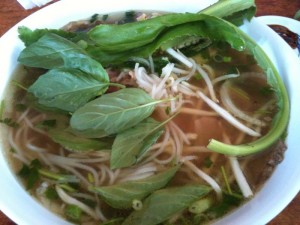As a second-generation Asian American, my relationship to my heritage feels tenuous sometimes. When I live in a neighborhood without a large Asian population, haven’t spoken Taiwanese or Mandarin on a regular basis in years, and then there’s the whole interracial marriage thing. As much as I might neglect my roots, some things are hardwired. Such as a taste for certain foods: mung beans and tapioca in the summer, red beans with mochi in the winter; bitter melon seasoned with just a hint of ginger for extra pungency; anything involving cilantro, shitake mushrooms or fried shallots.
All these foods send certain experiences and feelings rushing through my bloodstream, awakening a part of me that is very much a product of my heritage. But the way to really mainline a culture is through its soup. True, pho is a Vietnamese soup, with its clear but complex broth and tangles of noodles. It has hints of the food of Taiwan: the rice noodles, the fresh bean sprouts and chopped cilantro. And having spent many of my formative years in San Jose, Vietnamese food is almost as comforting as mom’s home cooking.
After all, someone’s mom (or father, grandmother, someone not in a focus group) devised this recipe, and spent hours stewing beef bones and other aromatics to make this. It is simple food, made with the humblest of ingredients — beef tendons… tripe, anyone? Despite how comforting I find this type of soup, I rarely make it at home for my boys. And definitely not in the 90-degree heat of July.
So the other day, I dragged the kids to a nearby Vietnamese restaurant. I found a relatively benign chicken pho (with white meat cut off the bones) for them. They slurped up the noodles, my younger son getting sticky white strands stuck to his clothes, but I didn’t mind. At the end of the meal, they admitted it wasn’t their favorite food. But I give them (and myself) credit for trying.
Andrea Nguyen’s blog Viet World Kitchen gives a much better explanation of Pho Bo, along with recipes. It must be fate, because one of her posts this week is on Taiwanese Niu Ro Mien!

